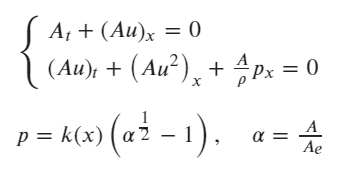deepxde
 deepxde copied to clipboard
deepxde copied to clipboard
I'm not sure if tf.sqrt caused the loss to be nan
Hi Dr.Lu, Thank you very much for sharing and answering. I am trying to simulate a system of equations and solve it by DeepXDE. However I meet a problem. In order to briefly, I give the picture and the code.
A set of equations are given by

The input variables are x and t as well as the outputs are A and u. Ae = 1, k(x) = 1.
Then I set up a network.
from __future__ import absolute_import
from __future__ import division
from __future__ import print_function
import deepxde as dde
from deepxde.backend import tf
import numpy as np
from matplotlib import pyplot as plt
dde.config.real.set_float64()
Ae = 1.0
k = 1
rho = 1.0
def pde(x,f):
A = f[:,0:1]
u = f[:,1:2]
# p = f[:,2:3]
# eq3 = (p/k + 1 )**2 - (A/Ae)
# eq3 = p - k*((A/Ae)**(1/2)-1)
Au = A*u
Au2 = A*u*u
p = k*(tf.sqrt(A/Ae)-1)
A_t = dde.grad.jacobian(f, x, i=0, j=1)
# Au_x = dde.grad.jacobian(Au)
Au_x = tf.gradients(Au, x)[0][:, 0:1]
Au_t = tf.gradients(Au, x)[0][:, 1:2]
Au2_x = tf.gradients(Au2, x)[0][:, 0:1]
p_x = tf.gradients(p, x)[0][:, 0:1]
# p_x = dde.grad.jacobian(f, x, i=2, j=0)
eq1 = A_t + Au_x
eq2 = Au_t + Au2_x + p_x*A/rho
return [eq1, eq2]
# return [eq1, eq2, eq3]
A_ic = 1
u_ic = 1
def on_initial(_, on_initial):
return on_initial
def func_IC_A(x):
return A_ic
def func_IC_u(x):
return u_ic
def boundary_Al(x, on_boundary):
return on_boundary and np.isclose(x[0], 0)
def boundary_ul(x, on_boundary):
return on_boundary and np.isclose(x[0], 0)
def boundary_Ar(x, on_boundary):
return on_boundary and np.isclose(x[0], 1)
def boundary_ur(x, on_boundary):
return on_boundary and np.isclose(x[0], 1)
geom = dde.geometry.Interval(0, 1)
timedomain = dde.geometry.TimeDomain(0, 1)
geomtime = dde.geometry.GeometryXTime(geom, timedomain)
IC_A = dde.IC(geomtime, func_IC_A, on_initial, component = 0)
IC_u = dde.IC(geomtime, func_IC_u, on_initial, component = 1)
BC_Al = dde.DirichletBC(geomtime, lambda x: 0, boundary_Al, component = 0)
BC_ul = dde.DirichletBC(geomtime, lambda x: 0, boundary_ul, component = 1)
BC_Ar = dde.DirichletBC(geomtime, lambda x: 0, boundary_Ar, component = 0)
BC_ur = dde.DirichletBC(geomtime, lambda x: 0, boundary_ur, component = 1)
data = dde.data.TimePDE(
geomtime,
pde,
[IC_A, IC_u, BC_Al, BC_ul, BC_Ar, BC_ur],
num_domain = 1000,
num_boundary = 50,
num_initial = 100,
)
net = dde.maps.FNN(
layer_sizes = [2] + [50]*5 + [2],
activation = "tanh",
kernel_initializer = "Glorot uniform"
)
model = dde.Model(data, net)
model.compile('adam',
lr = 0.0005,
# loss_weights=[1, 0.001, 100, 100, 100, 100]
)
model.train(epochs=1000)
But the loss function has nan cases:
Initializing variables...
Training model...
Step Train loss Test loss Test metric
0 [2.12e-03, nan, 1.02e+00, 1.15e+00, 1.16e-03, 1.19e-02, 1.03e-04, 4.83e-03] [2.12e-03, nan, 1.02e+00, 1.15e+00, 1.16e-03, 1.19e-02, 1.03e-04, 4.83e-03] []
1000 [nan, nan, nan, nan, nan, nan, nan, nan] [nan, nan, nan, nan, nan, nan, nan, nan] []
Best model at step 0:
train loss: inf
test loss: inf
test metric:
The problem is the second loss function and the corresponding code is " eq2 = Au_t + Au2_x + p_xA/rho ". Further, the problem is " p = k(tf.sqrt(A/Ae)-1) ". I find that nan does not appear if tf.sqrt() (same as **(1/2) ) is removed.
I don't understand why? Looking forward to your answer~
PS: This problem does not occur if p is set as the output of the network ( inputs: x,t, outputs: A, u, p ).
When defining "eq3 = p - k*((A/Ae)**(1/2)-1) ", the net will work, while net cannot work if "eq3 = p - k*(tf.sqrt(A/Ae) -1) ".
You need to make sure A/Ae > 0.
You need to make sure A/Ae > 0.
Oh my God, To be so involved with the result that forget the most important details. Thx~
You need to make sure A/Ae > 0.
Oh my God, To be so involved with the result that forget the most important details. Thx~
Hi, Would you like to tell me how you did in order to make sure A/Ae>0?
Hi, you could use function tf.sign to make sure A/Ae>0